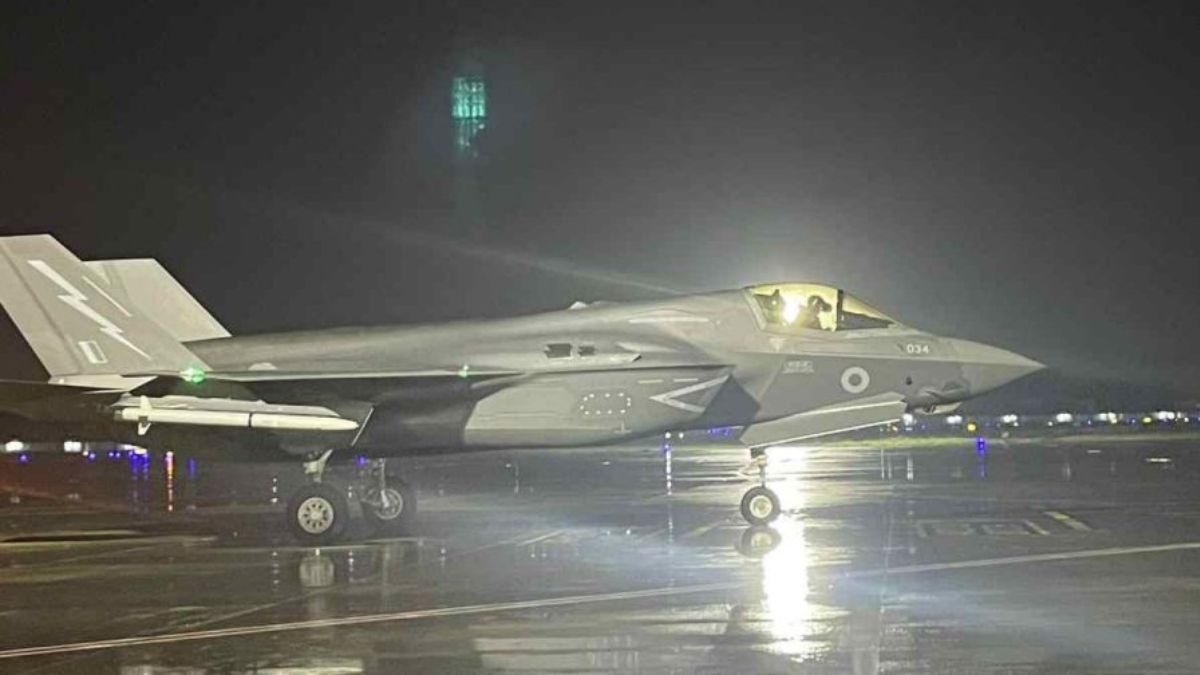UK's F-35B aircraft still stuck in India. Will this affect global demand for the world's most advanced fighter jet?
 F-35B Lightning II stealth fighter jet has been stranded on the tarmac of Thiruvananthapuram International Airport since June 14 and is being guarded by CISF personnel | Manorama
F-35B Lightning II stealth fighter jet has been stranded on the tarmac of Thiruvananthapuram International Airport since June 14 and is being guarded by CISF personnel | Manorama
Nearly three weeks after the F-35B Lightning II fighter jet, part of the HMS Prince of Wales Carrier Strike Group of the UK's Royal Navy, made an emergency landing in Kerala's Thiruvananthapuram, the highly advanced fifth-generation fighter jet continues to be grounded in the state.
The emergency landing and continued grounding of the fighter jet, worth over $110 million and known to be one of the most advanced fighters globally, was recently taken up in the UK House of Commons.
Minister for the Armed Forces Luke Pollard, reacting to a question from Conservative MP Ben Obese-Jecty on what is being done to recover the fighter jet and what measures are place to protect the technologies of the aircraft while it is in hanger, said, "We continue to work with our Indian friends who provided first-class support when the F-35B was unable to return to the Prince of Wales when on a flight mission. I am certain that the security of the jet is in good hands because Royal Air Force crew are with it at all times."
ALSO READ: US military supply chain has a Chinese problem: Why US defence base is not equipped for a war with China
Known simply as the 'Lightning' in British service, the F-35B model is the short take-off and vertical landing (STOVL) variant of the fighter jet that is designed to operate from short-field bases and air-capable ships. The F-35B is the only fifth-generation fighter jet with short takeoff and vertical landing capabilities, making it ideal for operating from smaller decks, austere bases and ships.
The F-35 fighter jet programme of the US has had its own fair share of troubles and controversies—from the debunked 'kill switch' myth, incidents of the aircraft being involved in accidents and crash landings, to allegations and claims that the aircraft's software grants access to Pentagon to monitor the movement of these planes even after they are sold to other countries.
Will the incident affect demand?
However, despite these isolated incidents owing to technological issues, and even as the emergency landing in Kerala attracted significant media attention, the stealth aircraft, developed by Lockheed Martin, continues to be in high demand among US allies and partners. This is even as the Pentagon has significantly reduced its procurement request for the F-35 in the upcoming fiscal year.
On June 24, the UK announced that it will procure 12 F-35A jets, capable of carrying nuclear weapons. "These F-35 dual-capable aircraft will herald a new era for our world-leading Royal Air Force and deter hostile threats that threaten the UK and our allies," UK Prime Minister Keir Starmer had said.
READ MORE: As MICA missile evolves with NG variant, India has a chance to supercharge Rafale firepower
Switzerland, meanwhile, is in the process of negotiating a deal to reduce the price as the US Defence Security Cooperation Agency (DSCA) wants the country to cover the additional costs. "From the DSCA's point of view, Switzerland will have to bear additional costs due to the high inflation in the US in recent years and the sharp rise in raw material and energy prices in the aftermath of the Covid pandemic...The Federal Council is sticking to the validity of the fixed price," a statement from Switzerland's Federal Council government had said. However, there is no plan to cancel the order.
Denmark, which already has received 15 F-35A jets, is set to get the remaining aircraft in the 27 jet deal throughout the next year, while Canada's procurement is facing some delays due to cost escalation.
Given the continued demand for the advanced jet, it appears that unless the grounding of the aircraft in India reveals a previously unknown, critical flaw in the F-35's design or reliability, it is unlikely to impact US sales prospects in a major way.
Defence